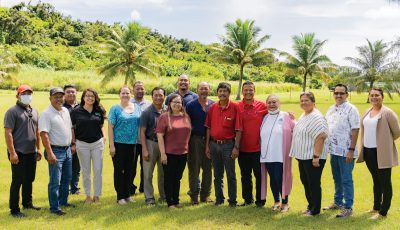Cruz calls for update on Guam minimum wage study
HAGÅTÑA, Guam—Keen to begin analysis of economic data on the effects of last year’s single dollar increase to the minimum wage, Vice Speaker Benjamin J. F. Cruz has issued Freedom of Information Act requests to the Guam Department of Labor and the Guam Economic Development Authority on Friday to ensure that agencies are making timely progress on the Independent Economic Impact Statement as required by Guam Public Law 32-229.
The economic study is part of the unanimous, bipartisan compromise implemented to allay concerns of both private and public sector stakeholders who were critical of Bill 316-32, legislation Cruz introduced in April 2014 to boost Guam’s minimum hourly wage to $10.10 in three annual 95-cent increments. After days of public hearings and a threat of a veto, a pared-down version of the measure was passed and enacted into law as P.L. 32-178 in July 2014, reducing the increase to a single dollar—from $7.25 to $8.25 an hour—effective Jan. 1, 2015.
Senators agreed to resume discussion on future increments based on the findings of the one-year independent economic impact study, to be completed on March 30, 2016, on the effects of the minimum wage increase authorized through P.L. 32-178.
“The people of Guam, workers and their employers alike, deserve timely, tangible evidence of the economic effects of the wage increase,” said Cruz, whose request aims to yield all public records related to the economic statement, including the full procurement file for any request for proposal issued for its conduct, as well as any related correspondence. “By acquiring these documents, we are not only ascertaining whether GDOL and GEDA are fulfilling their duties to the community, but we are also ensuring that the future of wage increases will not fall victim to bureaucratic malaise.”
The one-year impact study serves as an assessment of the 2015 wage increase’s effect on several aspects of Guam’s local economy. Under P.L. 32-229, GDOL is tasked with issuing the RFP for its conduct, and working with GEDA to identify its funding, and with the University of Guam to determine its parameters. However, despite the impending deadline for completion in less than three months, Cruz has not received updates on the statement’s progress from the entities assigned to ensure the conduct of the study.
“To delay such evidence would be a denial of the independence and dignity that hardworking, minimum wage earners deserve,” said Cruz. “No one who works a full-time job should have to live in poverty; that is as true today as it was a year ago.”
Since the enactment of the wage increase last year, Cruz notes, unemployment and overall inflation on Guam have decreased. According to the most recent Bureau of Labor and Statistics employment report, Guam’s economy has witnessed an additional 1,270 private sector jobs in June 2015 when compared to the previous year. Similarly, economist Joseph Bradley predicts a 3- to 4-percent economic growth in his latest forecast, suggesting an environment conducive to a second wage increase for Guam since the federal minimum wage was increased to $7.25 in 2010.
“Evidence presented in 2014 show that contrary to what opponents have contended, raising the minimum wage will not eradicate jobs, incite massive inflation, or spur the use of public benefits,” said Cruz, whose hallmark legislation was the result of 18 months of study, data collection, and analysis—including consultation with no fewer than five private and public sector economists. “Accordingly, I am confident that an honest, unbiased impact study will support additional increments as I originally proposed in 2014.” (PR)



























